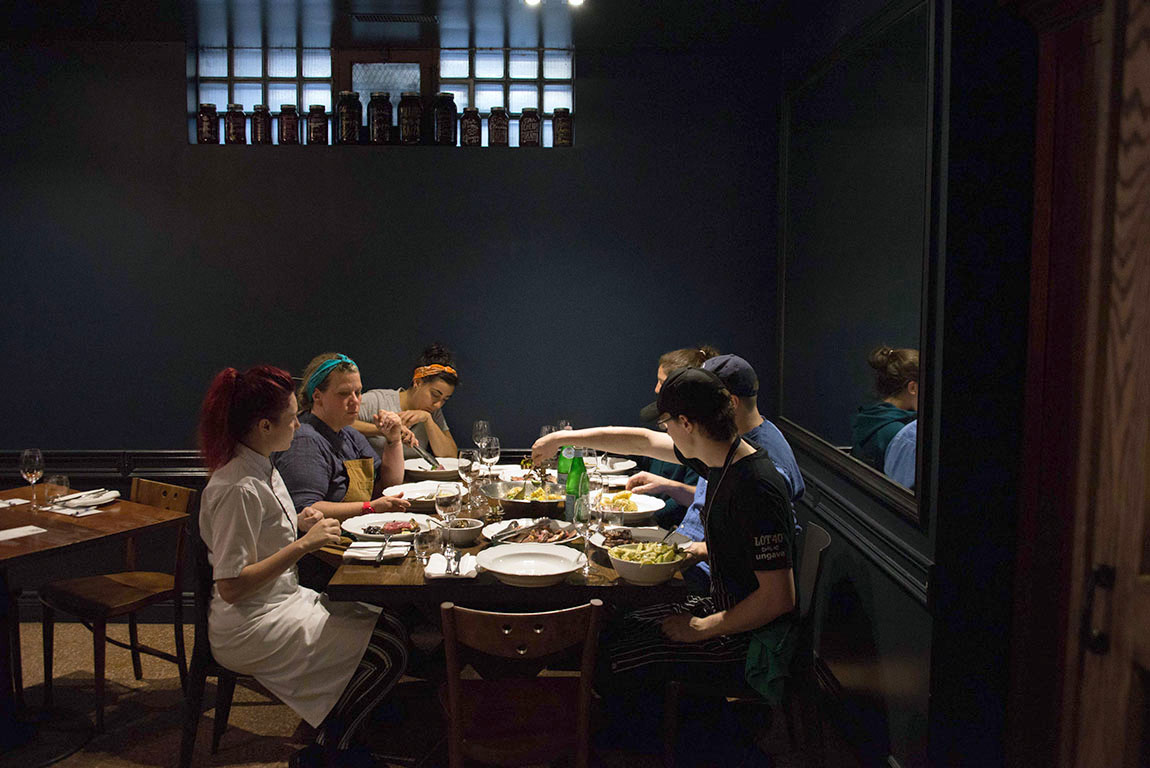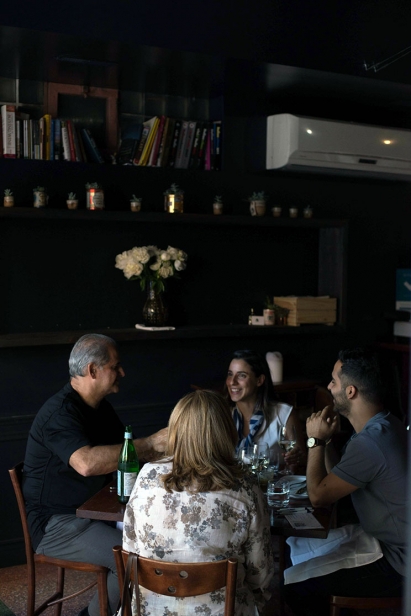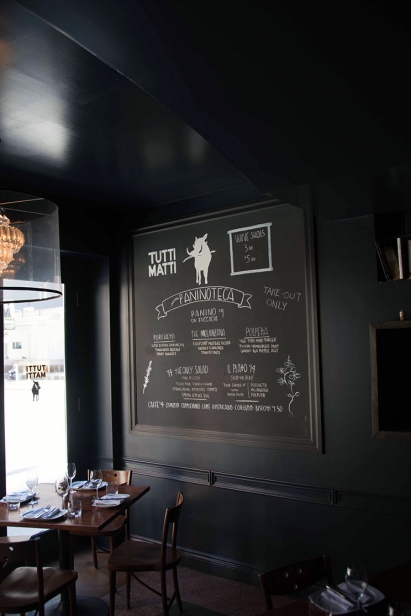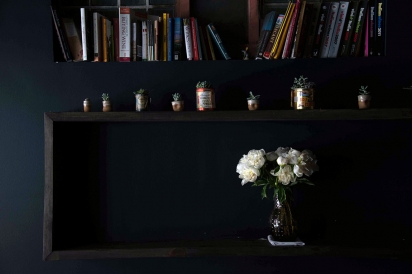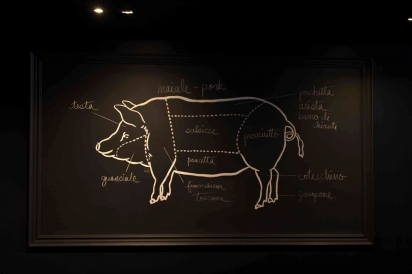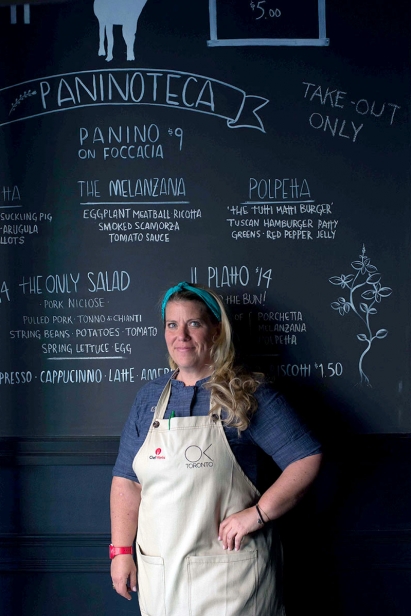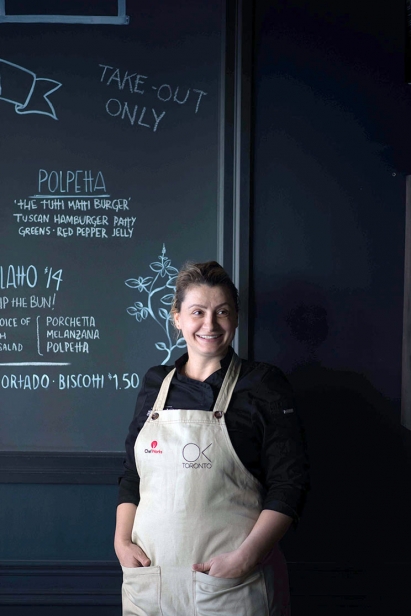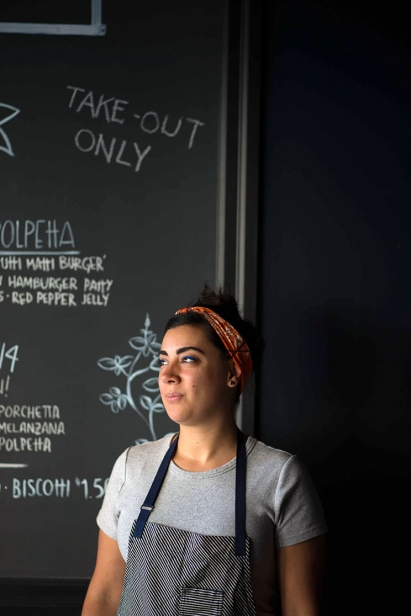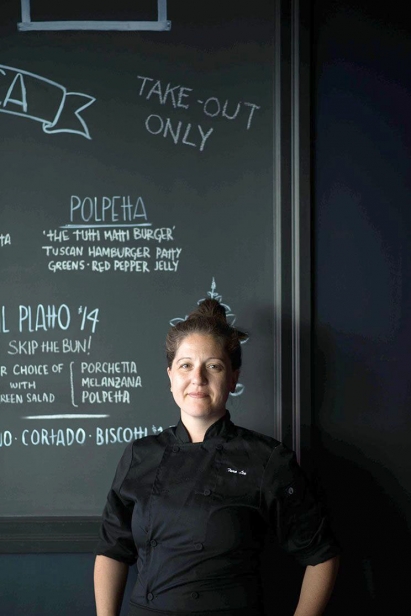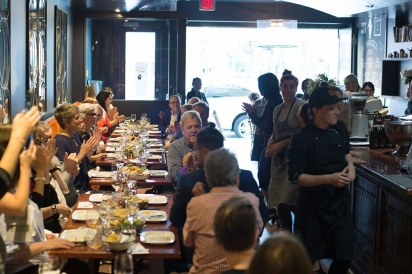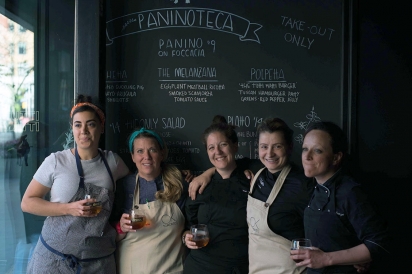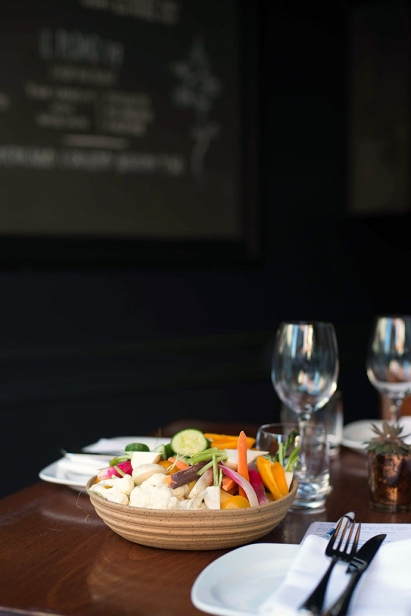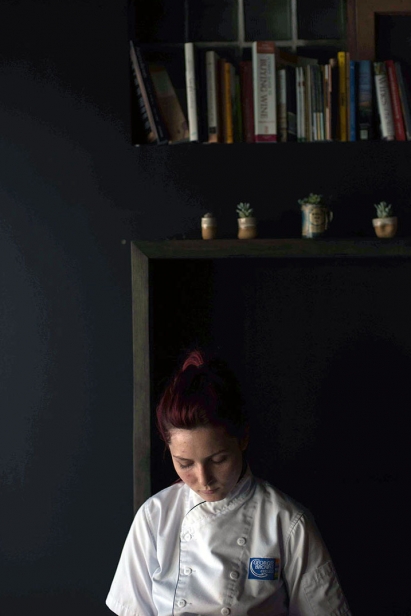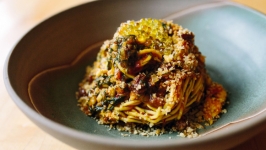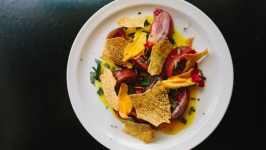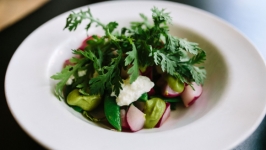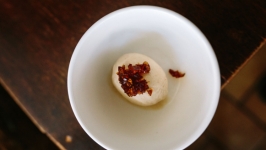Going All-In
It was an innocuous enough Instagram photo that set all kinds of wheels rolling.
Restaurateur Stacey Patterson, who owns Ufficio and Il Fornello, describes it simply: “A photo of all the male chefs in the city together at a table playing poker. That was the inspiration.”
Chef Ivana Raca who is co-owner at Ufficio and Resto Boemo, agrees: “It was a trigger. Like, why can’t women have that?”
With their colleague Jennifer Coburn, also of Ufficio, they decided they were going to change an important professional demographic — the near absence of female chefs from Toronto restaurant kitchens.
To level the playing field, the three women earlier this year launched Open Kitchen Toronto (OKTO), a dinner series that puts female chefs front and centre to raise funds for a scholarship for female-identified students at George Brown College's Culinary Arts program.
“We thought, why are there not more female chefs?” Patterson says. “So we went to George Brown and said we’ve got to find a way to get more females in the kitchen.” Four dinners in, the initiative has already raised more than $25,000 — enough to help cover tuition and the cost of program materials for selected students. And that’s not even including a $100,000 pledge to the George Brown College Foundation received at an OKTO dinner in June that will be allocated among several different scholarships.
The siege of the unlevel playing field is coming from other directions, as well.
Danielle Nicholls, a sommelier and wine agent at The Living Vine, was inspired by the ambition to get women seats at the table when she started 86 Common Collective. In the restaurant world, to 86 something is remove it, to indicate that it’s no longer available — and 86 Common Collective’s goal is to “86” gender inequality by shedding light on prominent women within the restaurant industry through a photo and interview series.
“There’s this big bro culture with chefs in Toronto, and women are now saying it’s our turn because we need some attention,” Nicholls says. “The more media attention, the more money you make, the more power you have. It all relates.”
Nicholls and her co-founder, photographer Erin Leydon, started with the idea of showcasing the diversity of female sommeliers in the city through a photo exhibition, but the project quickly grew into a website as well, featuring interviews with sommeliers and chefs. Next year, they plan to feature restaurateurs and bartenders.
“I was trying to bring people together and network and collaborate, but it’s become something more,” Nicholls explains. “With everything happening with the Me Too and Time’s Up women’s movements, we’re now having that bigger conversation.”
As the Me Too movement has exposed, the restaurant industry has long been a hotbed for sexual harassment and assault. Big name chefs and restaurateurs such as Mario Batali, John Besh and Ken Friedman, and Canadian winemaker Norman Hardie, have all come under fire for their alleged misconduct, shining light on a widespread problem in the male-dominated industry.
But beyond the horror stories of assault and harassment, there are also structural obstacles to women making a mark in the restaurant world. Female chefs, restaurateurs and sommeliers say they often need to de-emphasize their femininity to gain anywhere near the respect naturally accorded to their male counterparts — and even then, they’re unlikely to garner equal public acclaim and attention. A quick look at any “50 Best Restaurants” or “Best Chefs” list of recent years tells the story: Women are grossly underrepresented.
The importance of exposure is something Amanda Cohen, Toronto native and chef of Dirt Candy in New York City, has long preached. In an essay for Esquire last November, Cohen lamented the fact that the media only really seek female chefs out when they need a victim. “Women are second-class citizens in the restaurant world,” Cohen wrote. “We have less access to investors and are perceived as less profitable investments because, in large part, we have smaller profiles than male chefs… Women need safe places to work. But until the playing field is financially level, there will never be safe places, because we will never be able to control our own futures.”
In December, 86 Common Collective will host a photo exhibition at the Gladstone Hotel to highlight women in the industry. Beyond that, Nicholls is also working with the Gladstone to showcase female chefs and sommeliers at their monthly Harvest Wednesday dinners, which run from spring through fall. The first dinner in May saw the Grape Witches — sommelier Krysta Oben and wine importer Nicole Campbell — take centre stage, literally and figuratively, as they explained each wine pairing to the room of diners in their inimitable, fun and fresh style (think “pond water aesthetic” to describe unfiltered orange wine.) Nobody in attendance could ever again think that a sommelier needs to be a man in a suit.
Other Harvest Wednesday dinners will feature chefs such as Tara Lee, Emma Herrara, Trista Sheen and the Syrian immigrant women of Newcomer Kitchen, a non-profit organization that allows Syrian women a safe space to cook weekly meals. “If we can have a platform for these women to be front and centre for a day, it just connects and elevates everyone,” Nicholls says.
A few emerging female chefs are already stepping into the long-denied limelight. At a recent OKTO dinner at Tutti Matti, the first OKTO scholarship recipient joined some of the leading women of Toronto’s culinary season in the kitchen. For 20-yearold George Brown student Lily Rose, working beside owner Alida Solomon and an all-star crew that included Lee, Raca, Giovanna Alonzi of Terroni and Paula Navarrete of Momofuku Kojin, must have given a true sense of arrival.
Rose might not even be in school anymore if it weren’t for the support from OKTO. At 17, she left home to get away from an abusive stepfather and turned to restaurant jobs for money. She worked front and back of house, in bakeries, in catering, in mall restaurants — anywhere she could find a decent work environment and a steady paycheck.
Last year, Rose decided to enroll at George Brown to sharpen her skills, but then teachers went on strike and she was forced to return to full-time work. When the strike ended after five weeks, returning to school was a challenge. Coming to class from her home near Newmarket each day took time and money Rose couldn’t spare.
“I was late for class one day and apologizing,” Rose says. “But my teacher said, ‘Don’t worry about it, and by the way, there’s this scholarship you should apply for.’ I’d thought I was in trouble, but he said, ‘I see your desire and talent and I really want you to win this.’” That support and belief helped Rose recommit to school, and ultimately to win the inaugural OKTO scholarship. Now, she not only has her schooling costs taken care of, but she has a new network of female mentors, led by Raca and Patterson.
As we chat at Assembly Chef’s Hall, where Raca runs Resto Boemo, she and Patterson even offer Rose a job at Ufficio this summer. “We want to train them,” Raca says of the scholarship recipients. “Going forward, our goal with these guys is to take them under our wing and raise them. That would be a huge achievement.”
Raca and Patterson stress that to really raise women to an equal footing in the industry, they have to engage men in the process. That’s why they invited Cory Vitiello (The Harbord Room) and Afrim Pristine (The Cheese Boutique) — two men who often find themselves with a seat at that Toronto food dude poker table — to help with the first OKTO dinner.
“I wish we could bring more men into the mix, but they are separate worlds right now to some extent,” Patterson explains. “All the male chefs are very supportive of each other, and they showcase it.” But among female chefs, “there’s not that camaraderie,” she adds. A case in point: Raca had never met half the women involved in the dinner series, including one of Toronto’s most recognizable chefs, Lynn Crawford, who, along with Lora Kirk, hosted the third OKTO dinner at their restaurant, Ruby Watchco.
Thanks to the OKTO dinners, Rose is not the only one who has now met Crawford and other successful female chefs; Raca is finally getting to meet them as well. “I know we’re all busy and we have our heads down, but it’s nice to come up for air and have a coffee with other leading women,” she says. “It is a male-dominated industry, but women are starting to lead it right now.”
Events such as the OKTO and 86 Common Collective dinners, along with other female-led events in the city including the Drake Hotel’s Judy Chicago-inspired dinner last October and the Greasy Spoon diner series organized by chef Charlotte Langley, of Scout Canning, and her Vancouver-based counterpart Mark Brand, not only create camaraderie, but show the outside world that women are ready to lead the industry forward. This is the new poker table and women are itching to get their fair share of the pot.
“It’s not about doing an all-female thing, it’s about merging into one kitchen,” Raca explains. “I worked twice as hard to get the same respect and I’m fine with that, but I don’t want it to be like that forever. It’s not right and it’s not fair.”
Open Kitchen Toronto
openkitchentoronto.com | @openkitchento
86 Common Collective
86commoncollectiveto.com | 403.919.9664 | @86commoncollective


